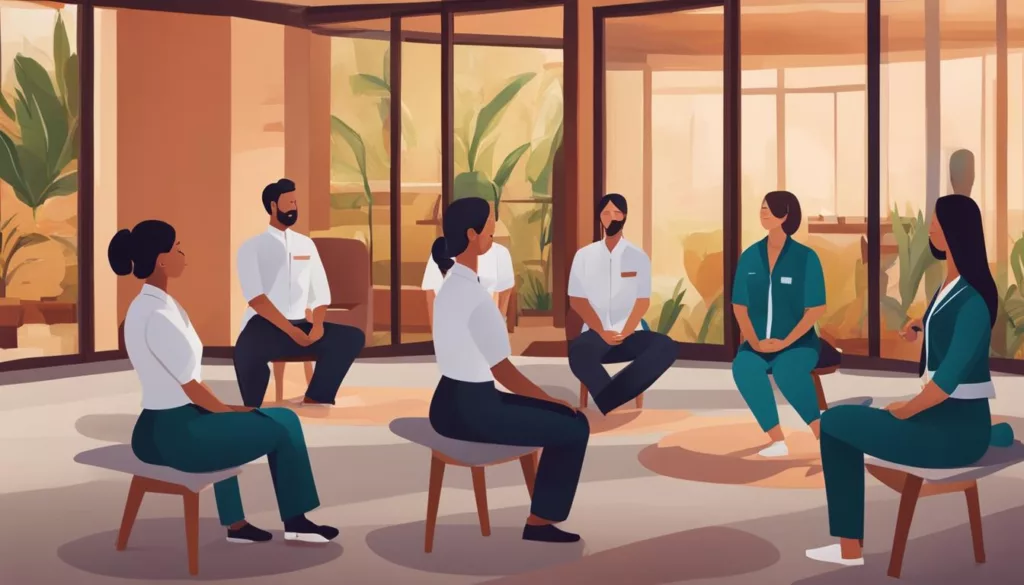Relaxation Practices for Hotel and Restaurant Staff
Welcome to our article on relaxation practices specifically designed for hotel and restaurant staff. In today’s fast-paced world, the mental health of employees, especially in the hospitality industry, has become crucial. This article aims to provide you with effective techniques and self-care practices tailored to help reduce stress, promote work-life balance, and provide essential mental health support.
As a hotel or restaurant employee, you often face unique challenges that can impact your mental well-being. Long hours, high-pressure situations, and constant customer interaction can take a toll on your overall health. However, with the right tools and resources, you can take steps to prioritize your mental well-being and create a healthier work-life balance.
Throughout this article, we will explore various strategies that can support your mental health journey, ranging from fostering a positive work culture and providing mental health resources to encouraging work-life balance and promoting stress-management techniques.
Remember, taking care of your mental health is just as important as taking care of your physical health. By implementing these practices into your daily routine, you can enhance your overall well-being and improve your job satisfaction within the hospitality industry.
Let’s dive into these relaxation practices and self-care techniques that can help you thrive in your role as a hotel or restaurant staff member.
Key Takeaways:
- Implement relaxation practices specific to the hospitality industry.
- Foster a positive work culture to support mental health.
- Provide mental health resources and support systems.
- Encourage work-life balance through breaks and self-care.
- Promote stress-management techniques for better resilience.
Recognizing the Challenges Faced by Restaurant Employees
The restaurant industry presents unique challenges that can impact the mental well-being of employees. It is crucial for employers to understand and acknowledge these challenges to create a supportive environment for restaurant staff. By recognizing the difficulties they face, employers can take proactive steps to address the mental health needs of their team.
Long Hours and High-Pressure Situations
Restaurant employees often work long hours, which can lead to fatigue, burnout, and increased stress levels. Coupled with fast-paced and high-pressure situations, such as navigating demanding customers and maintaining exceptional service standards, employees may experience heightened anxiety and emotional strain.
Constant Customer Interaction
Dealing with a constant stream of customers requires exceptional interpersonal skills and the ability to remain calm and composed under various circumstances. The continuous interaction with customers can sometimes result in difficult interactions, rude behavior, or unreasonable demands, adding an additional layer of stress and potential negative impacts on mental well-being.
Mental well-being support is crucial for restaurant employees who face long hours, high-pressure situations, and constant customer interaction.
Financial Pressures and Job Insecurity
Many restaurant employees face financial pressures due to low wages, limited benefits, and unstable work schedules. These financial challenges can contribute to stress and anxiety, especially when employees struggle to make ends meet or face job insecurity.
Physical Demands
The physical demands of working in a restaurant, such as standing for extended periods, lifting heavy objects, and being constantly on the move, can take a toll on the physical and mental well-being of employees. These physical challenges can result in fatigue, muscle strain, and increased vulnerability to work-related injuries.
Erratic Work-Life Balance
Irregular work schedules, including evening, weekend, and holiday shifts, can disrupt employees’ work-life balance and make it challenging to maintain personal commitments, engage in leisure activities, and spend quality time with loved ones. This imbalance can lead to feelings of isolation, stress, and decreased overall life satisfaction.
Being aware of these challenges empowers employers and leaders to implement strategies and support mechanisms that prioritize the mental well-being of their restaurant employees. From fostering a positive work culture to providing mental health resources, the next sections will explore actionable steps employers can take to support the mental well-being of their staff in the restaurant industry.
Foster a Positive Work Culture
Creating a positive work culture is essential for promoting good mental health among restaurant staff. When employees feel supported and valued, they are more likely to experience higher job satisfaction and overall well-being. Here are some key strategies to foster a positive work culture:
Encourage Open Communication
Establishing a culture of open communication is vital for creating a supportive environment. Encourage employees to share their ideas, concerns, and feedback without fear of judgment or retribution. Regular team meetings, suggestion boxes, and anonymous feedback channels can facilitate open dialogue and strengthen the bond between management and staff.
Establish Zero-Tolerance Policies
To ensure a safe and inclusive work environment, it is crucial to establish zero-tolerance policies for harassment and discrimination. Clearly communicate these policies to all employees, and provide training sessions to raise awareness and prevent such incidents. By fostering respect and equality, you create a culture where everyone feels valued and supported.
Provide Comprehensive Training
Investing in comprehensive training programs is key to equipping employees with the skills and knowledge they need to excel in their roles. From onboarding to ongoing professional development, offering training opportunities shows a commitment to employee growth and fosters a culture of continuous learning. Not only does this enhance job satisfaction, but it also contributes to positive mental well-being.

| Benefits of a Positive Work Culture | Impact on Mental Health and Well-being |
|---|---|
| Increased employee engagement | Lower stress levels |
| Improved teamwork and collaboration | Enhanced job satisfaction |
| Higher productivity | Reduced burnout |
| Lower turnover rates | Improved work-life balance |
Cultivating a positive work culture not only benefits employees but also has a positive impact on the success and reputation of the restaurant. By prioritizing mental health and creating a supportive atmosphere, you can foster a work environment where employees are motivated, engaged, and proud to be part of the team.
Provide Mental Health Resources and Support
Offering mental health resources and support systems is vital to safeguard the well-being of restaurant employees. Implementing an employee assistance program (EAP) that provides confidential counseling services and referrals can give employees access to professional help when needed.
Ensuring the mental well-being of your restaurant staff is essential for fostering a positive work environment and promoting overall job satisfaction. By offering mental health resources and support, you demonstrate your commitment to the well-being of your employees and create a culture that values their mental health.
Implementing an employee assistance program (EAP) is a proactive step toward providing comprehensive support. An EAP is a confidential and accessible resource that employees can turn to when they need professional help. It typically offers counseling services, referrals to mental health professionals, and resources for various mental health challenges, such as stress, anxiety, and depression.
An employee assistance program is designed to be confidential, ensuring that employees feel safe and comfortable seeking help without fear of judgment or repercussions. By emphasizing the confidential nature of the program, you can encourage employees to utilize the resources available to them and acknowledge that seeking professional help is a positive step toward self-care and well-being.
The benefits of implementing an employee assistance program extend beyond providing immediate support. By empowering your employees to access professional help, you contribute to a healthier and more resilient workforce. When employees have the resources and support they need to manage their mental health, they are better equipped to navigate the challenges they may face in their personal and professional lives.
Additionally, by prioritizing mental health resources and support, you send a message that the well-being of your employees is a top priority. This can enhance employee morale, loyalty, and job satisfaction, ultimately leading to a more productive and engaged workforce.
Remember, mental health resources and an employee assistance program are essential tools for supporting your restaurant staff’s well-being. By implementing these initiatives, you create a culture of care and demonstrate your commitment to fostering a mentally healthy workplace.
Key Takeaways:
- Implementing an employee assistance program (EAP) provides employees with access to confidential counseling services and referrals to professional help.
- EAPs create a culture that values mental health and demonstrates an employer’s commitment to the well-being of their staff.
- Mental health resources and employee assistance programs contribute to a healthier and more resilient workforce.
- By prioritizing mental health support, employers enhance employee morale, loyalty, and job satisfaction.
Encourage Work-Life Balance
Promoting work-life balance is crucial for the mental health of restaurant employees. In a fast-paced industry like hospitality, it’s essential to prioritize time for breaks and self-care. By incorporating these practices into your work routine, you can enhance your overall well-being and job satisfaction.
Take Regular Breaks
When working long shifts, it’s easy to get caught up in the hustle and forget to take breaks. However, breaks are essential for recharging your mind and body. Make it a priority to take short breaks throughout your shift, even if it’s just a few minutes to stretch, grab a healthy snack, or take a quick walk outside. By allowing yourself these moments of respite, you’ll replenish your energy and improve your focus.
Embrace Flexibility
Flexible scheduling can greatly contribute to work-life balance. Talk to your employer about the possibility of adjusting your working hours or exploring shift-swapping options with your co-workers. Having a schedule that accommodates personal commitments and interests can help you achieve a better balance between work and life outside of work.
Make Self-Care a Priority
It’s important to take care of yourself both physically and mentally. Engage in activities that bring you joy and help you unwind. This could include hobbies, exercise, spending time with loved ones, or practicing mindfulness and relaxation techniques. By prioritizing self-care, you’ll be better equipped to handle the demands of your job and maintain a positive mindset.
“Taking breaks and prioritizing self-care are not indulgences; they are essential for maintaining good mental health and work-life balance in the restaurant industry.”
Remember, achieving work-life balance is an ongoing process. It’s about making small changes and finding what works best for you. By prioritizing breaks, embracing flexibility, and practicing self-care, you can foster a healthier and more fulfilling work-life balance in the restaurant industry.
| Benefits of Work-Life Balance in the Restaurant Industry |
|---|
| Reduced stress levels |
| Improved mental well-being |
| Increased job satisfaction |
| Enhanced productivity and focus |
| Greater work-life integration |
Promote Stress-Management Techniques
In a fast-paced environment like the restaurant industry, equipping employees with effective stress-management techniques is crucial for their overall well-being. By offering workshops or training sessions focused on mindfulness, deep breathing exercises, and other stress-relief practices, you can help your restaurant staff better manage their stress levels and build mental resilience.
Practicing mindfulness can help employees develop a greater awareness of their thoughts, feelings, and bodily sensations, allowing them to respond to stressful situations in a calmer and more composed manner. Deep breathing exercises, on the other hand, provide a powerful tool for activating the body’s natural relaxation response, reducing stress and promoting a sense of calmness.
Remember, promoting stress-management techniques not only benefits your employees but also contributes to the overall well-being and success of your restaurant. Taking care of your staff’s mental health is a win-win for everyone.
Consider organizing stress-management workshops led by knowledgeable instructors or partnering with professionals who specialize in holistic well-being. These sessions can provide practical guidance and support to your employees, empowering them with effective stress-management tools that they can apply both at work and in their personal lives.
Benefits of Stress-Management Techniques for Restaurant Employees
- Improved focus and concentration, leading to better performance
- Enhanced emotional well-being, reducing the risk of burnout
- Increase in productivity and efficiency
- Ability to handle customer complaints and high-pressure situations effectively
- Greater job satisfaction and employee retention
By prioritizing stress management, you create a supportive and resilient work environment where your restaurant staff can thrive. Remember, a happy and mentally healthy workforce is the key to success in the hospitality industry.
Lead by Example
In order to create a culture of mental health and well-being in the restaurant industry, it is essential for leaders to prioritize their own self-care and mental wellness. By leading by example, you have the power to inspire and motivate your team to prioritize their mental health as well.
When you openly discuss the importance of mental health with your employees, you are breaking down barriers and normalizing conversations around well-being. This creates an environment where individuals feel comfortable seeking support and taking care of their mental health.
Role modeling self-care practices is crucial. Make sure to take breaks, practice stress-relief techniques, and engage in activities that promote your own well-being. Your team will notice and be encouraged to follow suit.
“As a leader, you have the opportunity to influence not only the success of your organization, but also the well-being of your employees. Prioritizing mental health and role modeling self-care can have a profound impact on the overall work culture and the lives of your team members.”
– Emily Johnson, CEO of Hospitality Wellness Solutions
Show your team that mental health is not only important for personal well-being but also for professional growth. Emphasize the connection between mental well-being and job performance. Encourage self-care activities such as meditation breaks, mindfulness exercises, or engaging in hobbies outside of work.
Mental health leadership involves fostering a supportive environment where employees feel safe to share their challenges and seek help when needed. When leaders prioritize their own well-being and openly discuss mental health, it creates a space for open dialogue and reduces the stigma surrounding mental health issues.
Remember, your actions speak louder than words. By exemplifying a commitment to self-care and mental wellness, you are not only taking care of yourself, but you are also inspiring and empowering your team to do the same.

Build a Supportive Community
Creating a sense of community among restaurant employees is essential for protecting their mental health. By fostering a supportive environment, employers can provide valuable resources and opportunities for team-building, social events, and celebrating achievements together. These community-building initiatives not only promote camaraderie but also reduce isolation, enhance overall job satisfaction, and contribute to a positive work culture.
Encouraging team-building activities allows employees to develop strong relationships, improve communication skills, and foster a sense of belonging within the workplace. Whether it’s organizing team-building exercises, group projects, or collaborative workshops, these activities create opportunities for employees to connect and work together towards common goals. By promoting teamwork, employers can empower their staff and cultivate a supportive community that encourages mutual support and growth.
Organizing social events outside of work can also play a crucial role in building a supportive community. These events provide an opportunity for employees to strengthen their bonds, socialize in a more relaxed setting, and deepen their connections beyond the workplace. Whether it’s a team outing, a holiday party, or a volunteer activity, such social events not only promote a sense of unity but also help restore work-life balance and enhance overall well-being.
Celebrating achievements together is another important aspect of building a supportive community. Recognizing and appreciating the accomplishments of individuals and teams can boost morale, motivate employees, and reinforce a sense of belonging. Whether it’s acknowledging milestones, applauding outstanding performance, or organizing employee appreciation events, celebrating achievements fosters a positive and encouraging atmosphere that contributes to the overall well-being of restaurant staff.
By prioritizing the establishment of a supportive community, employers create an environment where employees feel valued, supported, and connected. This, in turn, enhances their mental health, job satisfaction, and overall well-being.
Conclusion
By implementing these relaxation practices and self-care techniques, you can support the mental health of your hotel and restaurant staff. Prioritizing mental well-being is essential in the hospitality industry and can contribute to a positive work environment, increased productivity, and improved job satisfaction.
The demands of the hospitality industry can be stressful, but by recognizing the challenges faced by your employees and fostering a positive work culture, you can create an environment that supports their mental health. Providing access to mental health resources and support systems, encouraging work-life balance, and promoting stress-management techniques are also crucial steps.
Additionally, leading by example and building a supportive community among your staff can have a significant impact on their well-being. By prioritizing mental health support in the hospitality industry, you are investing in the overall wellness of your team and ultimately creating a stronger and more successful business.
FAQ
What are some relaxation practices for hotel and restaurant staff?
Some relaxation practices for hotel and restaurant staff include meditation, deep breathing exercises, and mindfulness techniques.
What are some self-care practices that can support the mental health of hospitality workers?
Some self-care practices that can support the mental health of hospitality workers include setting boundaries, engaging in hobbies, and prioritizing rest and relaxation.
How can employers foster a positive work culture for restaurant employees?
Employers can foster a positive work culture for restaurant employees by encouraging open communication, promoting inclusivity, and providing comprehensive training and support.
What mental health resources and support systems can be offered to restaurant employees?
Restaurant employees can be provided with mental health resources and support systems such as employee assistance programs (EAPs) that offer confidential counseling services and referrals.
How can employers encourage work-life balance for their hospitality staff?
Employers can encourage work-life balance for their hospitality staff by promoting regular breaks, offering flexible scheduling options, and emphasizing the importance of self-care.
Are there any stress-management techniques that can be helpful for restaurant employees?
Yes, stress-management techniques such as mindfulness, deep breathing exercises, and engaging in physical activities can be helpful for restaurant employees.
How can leaders in the restaurant industry prioritize their own well-being and mental health?
Leaders in the restaurant industry can prioritize their own well-being and mental health by practicing self-care, seeking support when needed, and openly discussing the importance of mental health with their team.
How can employers build a supportive community among their restaurant employees?
Employers can build a supportive community among their restaurant employees by encouraging team-building activities, organizing social events, and celebrating achievements together.
How does prioritizing mental health support benefit the hospitality industry?
Prioritizing mental health support benefits the hospitality industry by creating a positive work environment, increasing productivity, and improving job satisfaction among hotel and restaurant staff.






